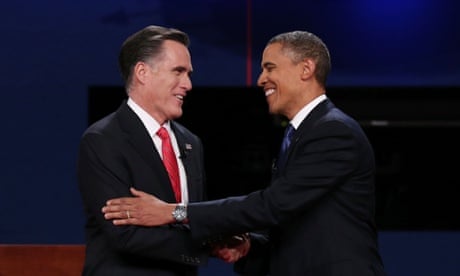Sometimes there are beliefs that just won't die, no matter how false they are. Witness a new article in Commentary by Michael Gerson and Peter Wehner. The authors argue that given the weak economy, Mitt Romney should have won the 2012 election. To be fair, these authors didn't invent the claim, but they do take it to next the next level.
If you believe Romney lost when he should have won, then he must have made a fatal mistake which needs to be fixed so that Republicans can win again. For Gerson and Wehner, this logic led them down the path of demographics: they conclude that Romney's biggest problem was a lack of minority outreach in a changing country. I don't think you can say that Romney had a racial rainbow of support, exactly, but I do want to answer their basic question: did Romney flush away a victory that the economy should have delivered to him?
Actually, Romney always had an uphill battle: the economy narrowly favored President Obama's re-election. Jamelle Bouie has stated this fact over and over again. John Sides, too, has stated this fact over and over again. Nate Silver has stated this fact over and over again. Have you noticed a pattern here? Smart experts reached the same conclusion. It's part of the reason we all correctly called a close, but comfortable Obama victory in 2012. It's why I said way back in September that it wouldn't be Mitt Romney's fault if he lost.
What are some people not seeing about the relationship between the economy and elections? For starters, most people don't vote over absolute numbers, like an unemployment rate of near 8%. Voters choose whether to re-elect based on changes in numbers, like the unemployment rate dropping from 10% in 2009 to 8% in 2012. That's why voters still overwhelmingly blamed Bush for bad economic conditions and not Obama, even if the unemployment rate remained high in a historical context.
To make the point mathematically (yes, that thing some fear), we can run a regression equation to predict Obama's chances in 2012 – it's not so bad: the equation compares growth in different sectors of the economy during prior elections. There were a few faulty models that were either based off of one economic variable or over-fit to match past results. The majority, however, favored Obama. Most of these either utilized just one economic variable or included a presidential approval variable. But in my opinion, one economic variable doesn't tell the whole story and approval ratings can be influenced to some degree by the economy.
There are two models I know of that employed multiple economic indices and no approval ratings: Bob Erikson and Chris Wlezien's leading economic indicator model and Nate Silver's economic index. Erikson and Wlezien's model simply takes into account continued quarter growth for elections since 1952, and uses the 10 leading economic variables (which are shown to be representative of overall strength in the economy), with quarters closer to the election weighted more heavily. Silver's model takes into account rolling averages of a month to a year of seven economic variables, which range from personal income growth to forecasted GDP to the stock market for elections since 1968.
The results of these models were remarkably similar: small Obama victories. Erikson and Wlezien, who authored the great book The Timeline of Presidential Elections: How Campaigns Do (and Do Not) Matter, actually overshot Obama's 3.9pt win by about a point, calling for a 5pt Obama victory. Silver's model slightly undershot it by having Obama take the election by about 3pt. The average of their results equals a 4pt Obama victory, or for Romney to hit the infamous 47%, which is pretty much where the numbers fell.
The average of the two most thorough economic models nailed the election results. This clearly indicates that given the economy, Obama should have won in 2012. A one or seven point victory would still indicate that 2012 was mostly about the economy – precision is more luck than anything else.
It's important to remember that these models have margins of errors and elections aren't only about the economy. Candidate ideology, for example, is generally worth a few points. Romney was generally seen as one of the more mainstream Republican candidates of 2012. Perhaps the even more moderate Jon Huntsman might have lost by only 2-3pt nationally.
Field work may have put Obama over the top in Florida – the closest state in 2012. But even if a better field organization yielded Romney those 29 additional electoral votes, Obama still would have had a major win.
The general point, though, is 2012, like most national elections, was mostly about the economy. A Mitt Romney victory would have actually been a surprise.
So, what about the Gerson and Wehner argument that Republicans will continue lose elections in which they are favored, unless they adjust to a new reality? It comes from a flawed premise of what happened in 2012, and doesn't have much bearing on how the economy affected the race. It's a completely different question as to whether or not Republicans will lose elections that the economy hands them. I'll have more to say about that coming days.
What I'll say for now is President Obama won the 2012 election because of the state of the economy, not in spite of it.
